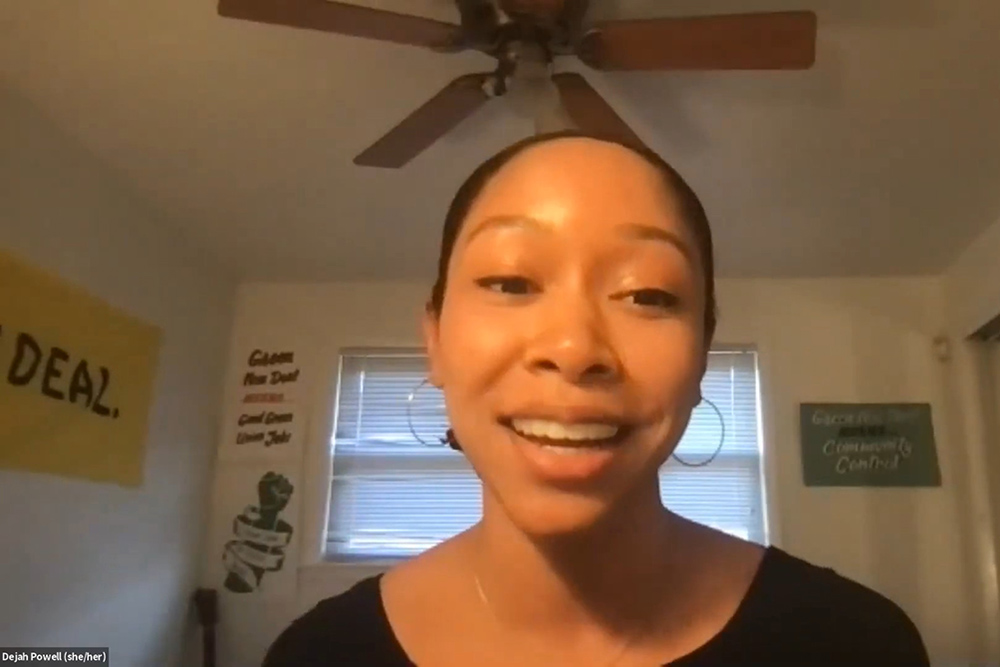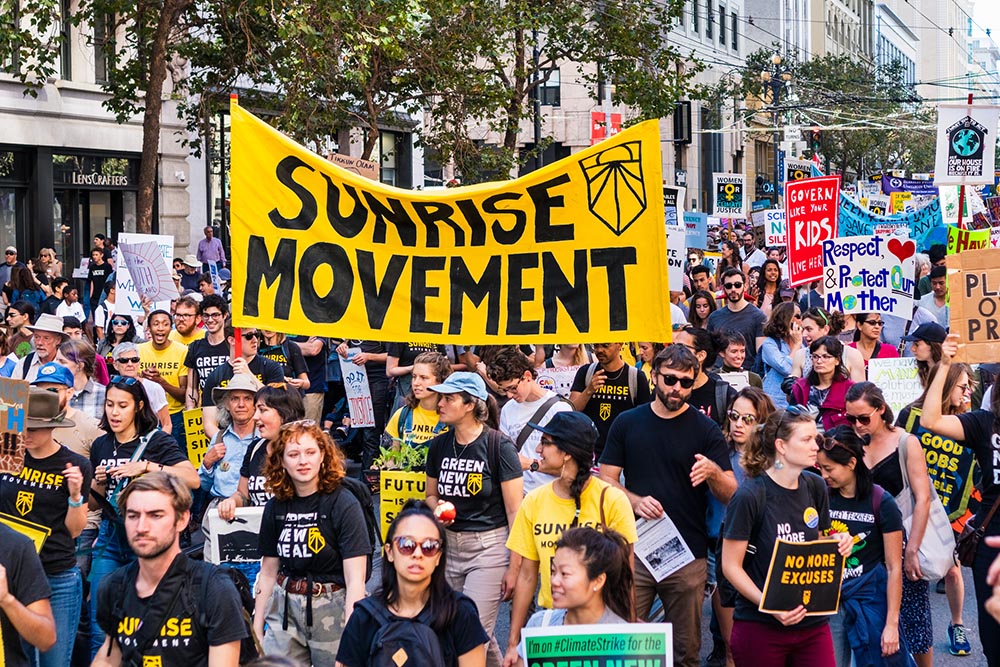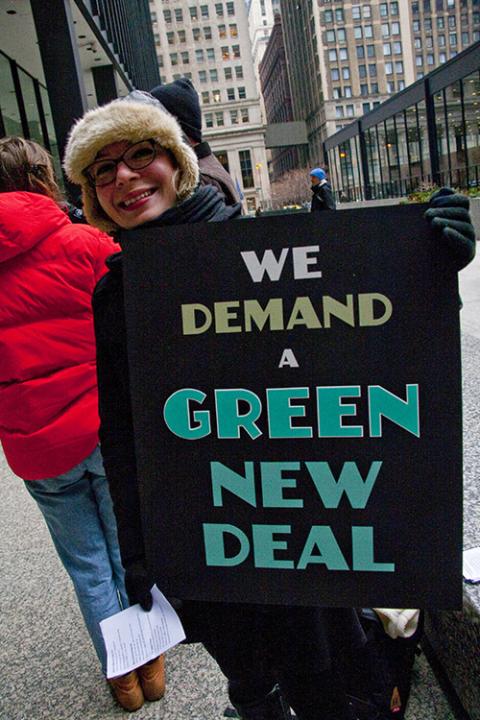
Dejah Powell (NCR screenshot)
Dejah Powell radiates passion when she speaks about the Sunrise Movement and the work she and other young people are doing to salvage a livable future by pressing U.S. politicians to respond to climate change at the magnitude that science says is necessary.
"I'm 25 years old. I spend every waking hour of my life trying to fight this climate crisis," she said March 18 during the keynote panel conversation at the Loyola University Chicago annual climate change conference.
Joining Powell was Vic Barrett, a member of Alliance for Climate Education and one of 21 young plaintiffs suing the federal government over climate change. The two discussed how they came to the climate movement, the challenges they face as Black activists and what gives them hope. Later, their mentors entered the conversation to talk about intergenerational climate action.
A native of Chicago's Southside suburbs, Powell was a STEM student obsessed with sharks and oceans. While she was at Cornell University, study abroad encounters with farmers in Bolivia, Morocco and Vietnam put the severity of the climate crisis into focus, and in September 2019 she joined Sunrise, where she now works full time as the Midwest lead organizer.
Speaking to EarthBeat a day before the keynote, Powell said her message to the faith community is a question: "Will you stand with us to fight for a livable future? And fight for a Green New Deal?"
The cornerstone of Sunrise's organizing, the Green New Deal is a sweeping blueprint for the U.S. to reach 100% clean energy and net-zero greenhouse gas emissions by 2030 while creating millions of high-wage jobs and using the transition from fossil fuels to address "systemic injustices" in labor, wages, race, housing and health.
Powell spends her days working on campaigns for a federal jobs guarantee, a plan to take the Green New Deal to cities and states, and prep for the 2022 and 2024 elections.
Advertisement
When asked where the climate movement will go after the pandemic, she responded, "To the streets." Critics who say the Green New Deal is too radical, or that Sunrise needs to compromise, miss the seriousness of the looming climate crisis, she added.
"People think that we're naive, when we have an understanding of what we need and a moral clarity of what we need," she said.
This interview has been edited for length and clarity.
EarthBeat: How did you get involved on climate change? And what led you to Sunrise?
Powell: I wanted to be a marine biologist growing up and would do summer programs, like go to the Bahamas or Hawaii. It's a fun way to spend the summer. Then I realized getting a Ph.D. in a lab wasn't going to be the thing that was going to stop this crisis.
I studied abroad when I was a junior in college. ... I had been reading this book by Naomi Klein called This Changes Everything, about capitalism and climate, and was learning more about our economic system, and realized that the science has been here since the 1980s [about] fossil fuel emissions and [their] connection to a warming climate. We knew the science, we just didn't have the political will of the country, and the government didn't have the public political will, to stop the climate crisis.
I went to the Sunrise meeting in the Sierra Club office two and a half years ago and heard young people talking about the problem and a solution that I felt very excited about. And it was just like, oh, yeah, this is the home and these are the young people that are going to ride the wave to the other side of a fossil fuel-free society, where we value people and communities over profit and corporations.
Do you remember what it was at that meeting that had you excited?
The first thing is that I walked into the room and they were 50-plus young people. And I never felt that energy in a lot of things that I would do. There were so many young people.
The second thing is they were [saying] this is our shared home, and it is threatened by fossil fuel billionaires who are funding politicians' careers, and they are the reason why we do not have action on climate, and we have to organize against them. And it's so clear to me that the way that we stop the climate crisis is to get fossil fuel money out of our political system and then push elected [officials] to fight for a solution — the Green New Deal, eventually, which we campaigned behind, once it was introduced by AOC [Alexandria Ocasio-Cortez] and Ed Markey.

Members of the Sunrise Movement carry placards and banners at the Global Youth Climate Strike Rally and March in San Francisco Sept. 20, 2019. (Dreamstime/Andreistanescu)
[I thought] this could actually dramatically transform the lives of people in my community. It wasn't just about carbon tax, cap and trade. It was 'We need a holistic solution to the climate crisis.' ... It was a vision that I felt was worth fighting for.
Are you hopeful about the future, given the climate changes we see?
[About] three years ago, I read The Uninhabitable Earth [by David Wallace-Wells]. ... It will terrify you. And I just remember wandering aimlessly. And then [I] landed upon Sunrise and have never felt more hopeful in my life that a generation of young people will put an end to the crisis.
I think a lot of people who are hopeless feel powerless to change things. One person can't stop climate change, and that's why we're building a mass movement. The thing I feel most excited about is showing people that you don't have to do it alone; the only way we chart the path forward is through mobilizing people power.
So, I'm incredibly hopeful. And I want to spread that hope to other young people and show them that this is a movement, and we need you to get off the sidelines and join us organizing and fighting to stop this crisis.
When you speak to your friends or other young people, especially outside of Sunrise, are they focused on climate change? And are they as hopeful as you are?
I see a mix of things. I think one is a numbness, like the inability to process what it means to be experiencing an existential threat. Some people are like, 'I don't think about it, there's nothing that we can do and so I'm gonna focus on things that feel more urgent to me and my life.'
[Other] people are terrified, and they don't know what to do or don't think there's a path to stop it. A lot of what my job as an organizer is, and our job as a movement, is to connect the crisis to the things that people care about in their day-to-day life. Whether it's jobs, or access to nature and the environment, or access to healthy food, all of that will be disrupted as the climate crisis exacerbates across the country. I see that as a way that we move people beyond ignoring the problem or feeling overwhelmed.
What do young climate leaders like yourself want to see from faith organizations on this issue? And how can faith organizations and youth-led climate groups work together?
I think the biggest question is will you stand with us to fight for a livable future? And fight for a Green New Deal?

A demonstrator participates in a Sunrise Movement rally for a Green New Deal in Chicago Feb. 27, 2019. (Flickr/Charles Edward Miller)
[Some faith groups] don't see the need to stand up for something as political as the Green New Deal. [The question is] how do we bring the faith community, whether it's the Catholic Church or the Black church from my own experience, to see how a Green New Deal [is needed] to protect the planet.
[In Laudato Si', Pope Francis wrote about] the reverence that we should hold for the environment and Earth. I'm not very religious — I went to Catholic school for two years when I was younger — but I think in the Bible we are also expected to be respectful and loving of the planet. And our society is not doing that. There is the need to stand on the side fighting for a solution, the Green New Deal, that is about protecting our relationship to each other and to the planet.
What would standing with you look like for faith organizations?
It's championing the Green New Deal. Talking to congregations about the Green New Deal. Hosting panels or conversations about climate, and just increasing the discussion.
I live in a bubble — I talk about climate every single day. And I talk about the Green New Deal with the people that I organize with every day, but that is not enough to win. So how do we inject this conversation into the communities that aren't talking about it? It's hosting conversations and educating people and then moving people into action.
How would you assess the Biden administration so far on climate policy?
I think it's helpful to note that we're in a pandemic, and part of his priority is getting people vaccinated and stopping this crisis. In the beginning of January, or early February, there were some wins, [like] a climate conservation corps, and we've seen different corporations commit to [transitioning completely from fossil fuels to electricity] by 2030, which is great. But we have a lot more to do.
So we're going to be watching as COVID relief passes and waiting to see how he prioritizes climate in the next few months, or in his first 100 days. There's been some [progress]. I think Biden is movable. We'll see how far we can move him on what [it's] going to take to stop climate change.
Are there specific actions that you're looking from him, or campaign promises you particularly want to hold him to?
We have this new campaign called Jobs for All, [which would involve] government programs similar to the Civilian Conservation [or] Public Works Administration Corps during the New Deal era — programs that were paying people to work to transition our economy post-World War II. We need a federal jobs guarantee [now] to transition our economy away from fossil fuels.








